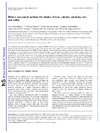Please use this identifier to cite or link to this item:
https://accedacris.ulpgc.es/handle/10553/44740
| Title: | Dietary assessment methods for intakes of iron, calcium, selenium, zinc and iodine | Authors: | Serra-Majem, Lluis Pfrimer, Karina Doreste-Alonso, Jorge Ribas-Barba, Lourdes Sánchez-Villegas, Almudena Ortiz-Andrellucchi, Adriana Henríquez Sánchez, Patricia |
UNESCO Clasification: | 3206 Ciencias de la nutrición | Keywords: | Validation Dietary Assessment FFQ Validation Minerals |
Issue Date: | 2009 | Journal: | British Journal of Nutrition | Abstract: | The EURopean micronutrient RECommendations Aligned (EURRECA) Network of Excellence is working towards developing aligned micronutrient recommendations across Europe. The purpose of the present study was to conduct a review of methods used in validation studies carried out in adults assessing dietary intake of EURRECA priority minerals. A search strategy and inclusion criteria were defined and a scoring system was developed to rate the quality of each validation study that produced a quality index with possible scores obtained ranging from 0.5 to 7. A MEDLINE and EMBASE literature review was conducted. Articles/validation studies meeting the inclusion criteria included: 79/88 for Fe; 95/104 for Ca; 13/15 for Se; 29/30 for Zn; 7/9 for iodine. The most frequently used method to ascertain dietary intake was the Food Frequency Questionnaire (FFQ), whereas dietary records (DR) and 24 h recalls were the most used reference methods. The correlation coefficients (CC) between study mineral intakes estimated by FFQ and the reference method were weighted according to the study's quality index and obtained acceptable to good ratings, ranging from 0.36 to 0.60 when the reference method was DR and from 0.41 to 0.58 when the reference was 24 h recalls. A minority of studies (n 9) used biomarkers for validation and among these, five included iodine obtaining a CC of 0.47. The FFQ was seen as a valid method for assessing mineral intake, particularly for Ca and, to a lower extent, for iodine and Zn. Se and Fe showed only acceptable correlations. The present review provides new insights regarding the characteristics that assessment methods for dietary mineral intakes should fulfil. | URI: | https://accedacris.ulpgc.es/handle/10553/44740 | ISSN: | 0007-1145 | DOI: | 10.1017/S0007114509993138 | Source: | British Journal of Nutrition [ISSN 0007-1145], v. 102 (sup. 1), p. S38-S55, (Diciembre 2009) |
| Appears in Collections: | Artículos |
SCOPUSTM
Citations
59
checked on Jun 8, 2025
WEB OF SCIENCETM
Citations
58
checked on Jun 8, 2025
Page view(s)
122
checked on Sep 21, 2024
Download(s)
141
checked on Sep 21, 2024
Google ScholarTM
Check
Altmetric
Share
Export metadata
Items in accedaCRIS are protected by copyright, with all rights reserved, unless otherwise indicated.
